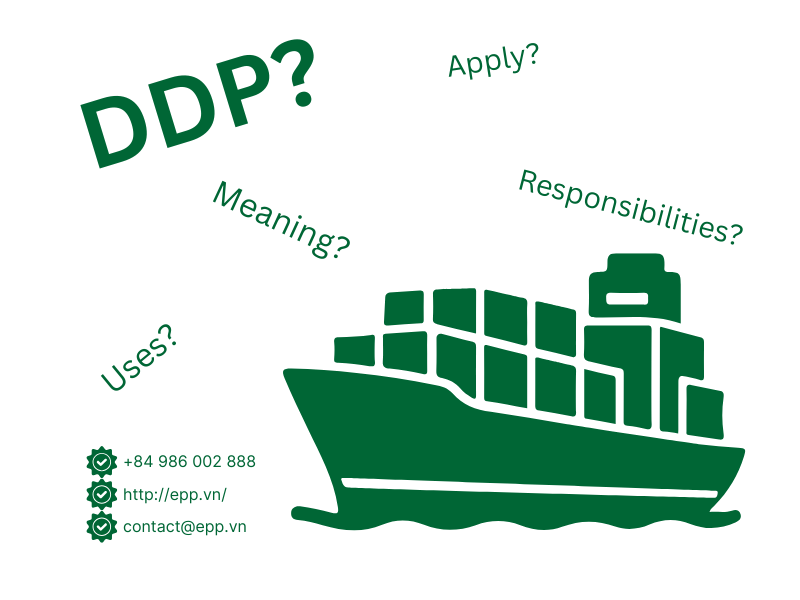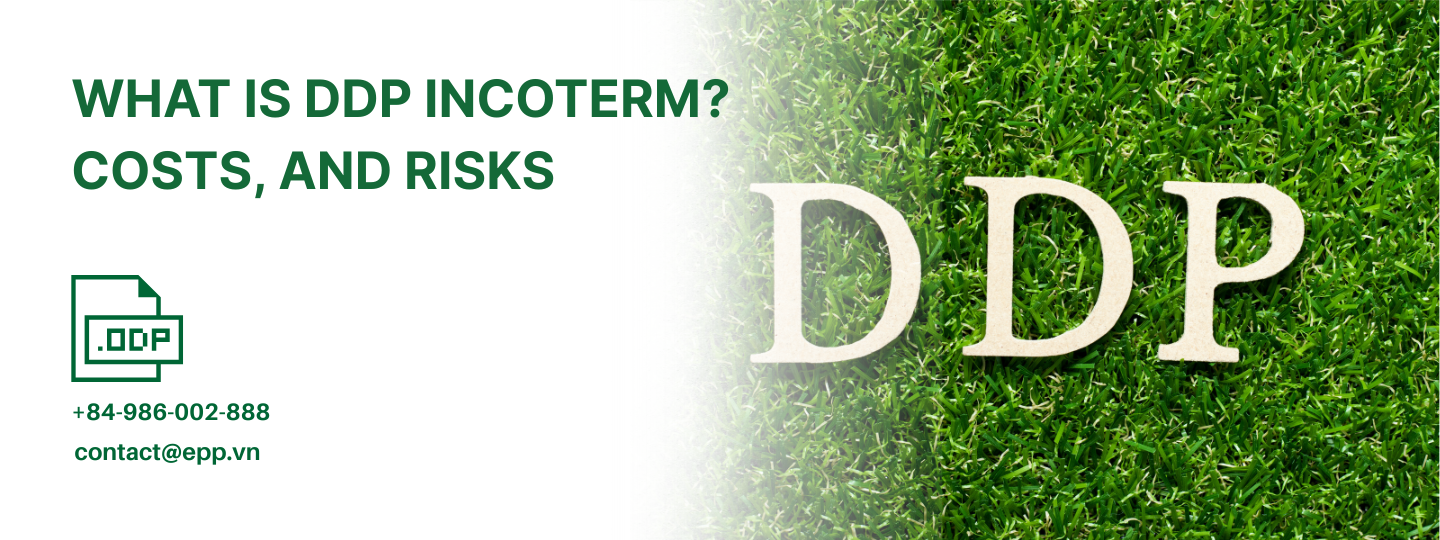DDP Incoterm, or Delivered Duty Paid, is a crucial concept in international shipping that significantly impacts the plastic packaging industry, particularly within the Flexible Intermediate Bulk Container (FIBC) sector. Understanding DDP is essential for businesses engaged in the import and export of goods, as it outlines the responsibilities, costs, and risks associated with shipping. This blog delves into the intricacies of DDP, providing valuable insights for stakeholders in the FIBC market.
Understanding DDP Incoterm
The DDP Incoterm is one of the eleven terms defined by the International Chamber of Commerce (ICC) that specify the obligations of buyers and sellers in international trade. Under DDP, the seller assumes maximum responsibility, covering all costs and risks associated with transporting goods to a designated destination. This includes not only shipping costs but also customs duties and taxes.
Responsibilities Under DDP
1. Seller’s Obligations: The seller bears the primary responsibility under DDP. Their obligations include:
– Transportation: The seller must arrange and pay for the entire transportation process from their location to the buyer’s premises. This encompasses selecting the mode of transport, whether it be sea, air, or land.
– Customs Clearance: The seller is responsible for clearing the goods through customs in both the exporting and importing countries. This involves preparing and submitting all necessary documentation, which can be complex and time-consuming.
– Payment of Duties and Taxes: The seller must pay all applicable tariffs, taxes, and charges incurred during the importation process. This can vary significantly based on the destination country and the nature of the goods being shipped.
2. Buyer’s Obligations: The buyer’s responsibilities under DDP are minimal but important. The primary obligation is to receive the goods at the agreed destination. Buyers should:
– Ensure Import Permits: Verify that they possess the necessary permits and licenses to import the goods into their country to avoid legal issues and delays.
– Provide Accurate Delivery Information: Ensure that the seller has all relevant information regarding the delivery location, including any specific requirements for unloading or access.
Costs Involved in DDP Incoterm
Understanding the costs associated with DDP is vital for businesses in the FIBC sector. Here are the key components of DDP costs:
– Transportation Costs: The seller bears all transportation expenses from the point of origin to the buyer’s location. This includes freight costs, handling fees, and any additional charges incurred during transit.
– Customs Duties and Taxes: The seller is responsible for paying all applicable customs duties and taxes. This can vary significantly depending on the destination country and the nature of the goods. For instance, certain countries may impose higher tariffs on plastic products, affecting overall costs.
– Insurance: While not mandatory under DDP, it is advisable for sellers to insure the goods during transit to cover potential losses or damages. Insurance costs should be factored into the overall pricing strategy to ensure adequate coverage.
– Handling and Storage Fees: Depending on the shipping route and logistics provider, additional handling or storage fees may apply. Sellers must account for these potential costs when calculating the total expense of delivering goods under DDP terms.
Risks Associated with DDP
While DDP offers convenience, it also comes with certain risks that both parties should be aware of:
– Seller’s Risks: The seller assumes all risks until the goods are delivered. This includes potential delays, damages, or losses during transportation. If the goods are damaged or lost, the seller is responsible for replacing them or compensating the buyer. This can lead to significant financial implications, especially in high-value shipments.
– Buyer’s Risks: Although the buyer has limited responsibilities, they must ensure that they can accept the delivery. If the buyer is unprepared to receive the goods, it could lead to additional costs or delays. For example, if the buyer’s facility is not equipped to handle the delivery, it could result in demurrage charges or the need for re-delivery.
Advantages of DDP Incoterm for the FIBC Industry
The DDP Incoterm is particularly advantageous in the FIBC industry for several reasons:
1. Simplicity for Buyers: Buyers can focus on their core business activities without worrying about the complexities of shipping logistics. This allows them to allocate resources more effectively and concentrate on growth and development.
2. Cost Predictability: With all costs covered by the seller, buyers can better predict their total expenses, making budgeting easier. This predictability is essential for financial planning and can enhance cash flow management.
3. Enhanced Supplier Relationships: By offering DDP terms, suppliers can strengthen their relationships with buyers, fostering trust and long-term partnerships. This can lead to increased customer loyalty and repeat business.
4. Market Competitiveness: Offering DDP can give suppliers a competitive edge in the market. Businesses that provide comprehensive shipping solutions are often more attractive to potential buyers, as they reduce the burden of logistics management.
Challenges of DDP Incoterm in the FIBC Sector
While DDP presents numerous advantages, it also poses unique challenges, particularly in the FIBC sector:
1. Complexity of Regulations: Different countries have varying regulations regarding plastic products and FIBCs. Sellers must stay informed about these regulations to ensure compliance, which can be a daunting task.
2. Potential for Increased Costs: While DDP can simplify the purchasing process for buyers, it can also lead to increased costs for sellers. Fluctuating tariffs, unexpected fees, and logistical challenges can erode profit margins.
3. Dependence on Logistics Providers: Sellers must rely on third-party logistics providers to fulfill their obligations under DDP. This dependence can introduce risks related to service quality and reliability.
4. Risk of Non-Compliance: If the seller fails to comply with customs regulations or does not pay the required duties, they may face penalties or delays. This can negatively impact the buyer’s operations and damage the seller’s reputation.
FAQs about DDP Incoterm
What does DDP stand for?
DDP stands for “Delivered Duty Paid.” It is an Incoterm that indicates the seller is responsible for delivering goods to the buyer’s location while bearing all costs and risks involved in the shipping process.
Who is responsible for customs duties under DDP?
Under DDP, the seller is responsible for all customs duties, taxes, and other charges incurred during the importation of goods. This includes ensuring that all necessary documentation is prepared and submitted.
What are the advantages of using DDP in international trade?
The advantages of using DDP include simplicity for buyers, cost predictability, enhanced supplier relationships, and a competitive edge in the market. Buyers benefit from reduced logistical burdens, while sellers can strengthen partnerships with clients.
Are there any risks associated with DDP Incoterm?
Yes, there are risks associated with DDP. The seller assumes all risks until the goods are delivered, which includes potential damages or losses during transportation. Buyers must also ensure they are prepared to accept the delivery to avoid additional costs or delays.
Can DDP be used for all types of goods?
Yes, DDP can be used for various types of goods, including those in the plastic packaging industry, such as FIBCs. However, sellers must be aware of the specific regulations and requirements for the type of goods they are shipping to ensure compliance.
How does DDP differ from other Incoterms?
DDP differs from other Incoterms primarily in the level of responsibility assumed by the seller. In contrast to terms like FOB (Free on Board) or CIF (Cost, Insurance, and Freight), where the buyer assumes more responsibility for costs and risks, DDP places the onus on the seller for nearly all aspects of the shipping process.
In conclusion, the DDP Incoterm is a vital aspect of international trade, especially in the plastic packaging industry and the FIBC sector. It simplifies the shipping process for buyers while imposing significant responsibilities on sellers. As businesses navigate the complexities of global trade, understanding DDP can lead to more efficient operations and better financial planning.
For companies seeking reliable suppliers in the plastic packaging industry, EPP Vietnam stands out as a leading provider. Their expertise in FIBC and commitment to quality ensure that businesses can thrive in a competitive market. By choosing EPP Vietnam, companies can benefit from streamlined logistics and a partner dedicated to meeting their packaging needs effectively.



